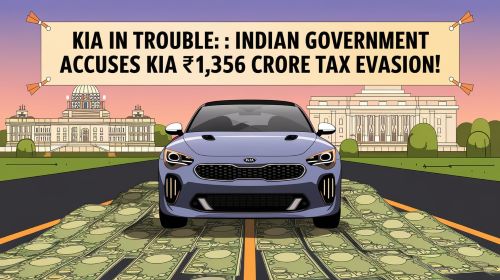The Indian automobile industry is witnessing a major tax evasion controversy involving Kia India. The South Korean automaker is now under the radar of tax authorities for allegedly evading customs duty worth ₹1,356 crore.
This shocking revelation comes just days after the Volkswagen Group found itself embroiled in a similar tax dispute.
Let’s delve deeper into the Kia tax evasion case and understand the challenges the company is facing in India.
Kia’s Tax Evasion Allegations: A Major Setback for the Brand
The Indian government has accused Kia of misclassifying imported auto components to reduce tax liabilities.
This move is seen as a violation of customs regulations, leading to a significant tax demand from authorities.
Key Highlights of the Kia Tax Evasion Case:

- Total Tax Evasion Amount: USD 155 million (₹1,356 crore)
- Accusation: Misclassification of imported components
- Import Strategy: Allegedly importing vehicles in separate parts to pay lower customs duty
- Confidential Notice: Issued in April 2024 by Indian tax authorities
- Impact: Legal troubles and potential fines for Kia India
What Is the Issue?
According to reports, Kia India imported its Carnival MPV in multiple parts instead of complete units.
This strategy allegedly helped the company reduce its customs duty burden by paying taxes applicable to components instead of fully assembled vehicles.
Understanding the Customs Duty Loophole
- The customs duty on completely built units (CBU) is significantly higher than the duty on imported components.
- Kia is accused of deliberately importing vehicles in different shipments, treating them as separate auto parts instead of full cars.
- This strategy led to a lower tax rate, resulting in an estimated evasion of ₹1,356 crore.
Volkswagen and Kia: A Similar Tax Evasion Pattern?
Just last week, Volkswagen Group took legal action against Maharashtra Customs, contesting a ₹11,000 crore tax demand. Now, with Kia facing a similar issue, it raises concerns about tax compliance in the Indian auto sector.
Key Similarities Between Kia and Volkswagen Tax Issues
| Aspect | Kia India | Volkswagen India |
|---|---|---|
| Tax Evasion Amount | ₹1,356 crore | ₹11,000 crore |
| Main Accusation | Misclassification of imports | Import duty evasion |
| Legal Notice | Issued in April 2024 | Legal battle with Customs |
| Impact | Possible fines and legal action | Ongoing court case |
These back-to-back tax disputes suggest that Indian authorities are tightening regulations on foreign automakers operating in the country.
Impact of Tax Evasion Case on Kia India
1. Potential Financial Penalties

If found guilty, Kia India may face hefty fines and additional tax payments, affecting its financial position in the country.
2. Brand Image and Customer Trust
Tax evasion cases can harm a brand’s reputation, leading to a loss of trust among Indian consumers. Kia has built a strong presence in the Indian market with its Seltos, Sonet, and Carens, but legal troubles could impact customer perception.
3. Future Investments and Operations
Legal issues may lead to stricter government scrutiny, affecting Kia’s future investments and new car launches in India.
The company may have to adjust its import strategies to comply with Indian tax regulations.
How Will Kia Respond?
Kia India has yet to issue an official statement regarding the allegations. However, the company may take the following steps:
- Legal Defense: Kia could challenge the tax demand in court, similar to Volkswagen.
- Negotiations with Authorities: The company may try to settle the dispute through discussions with Indian tax officials.
- Policy Revisions: To avoid future issues, Kia might revise its import practices to comply with Indian tax laws.
Government’s Stand on Tax Evasion
The Indian government has been actively tightening its tax policies, particularly in the automobile sector. Authorities are ensuring that all carmakers, whether domestic or international, follow fair taxation practices.

What This Means for Other Automakers
- Increased customs checks on vehicle imports
- Stricter compliance requirements for foreign brands
- Higher transparency in automotive taxation policies
This case serves as a warning for other automakers, emphasizing the importance of adhering to Indian tax laws.
Conclusion: What’s Next for Kia?
Kia India’s tax evasion allegations could have serious legal and financial consequences. As the Indian government continues its crackdown on tax evasion, foreign automakers must ensure compliance to avoid such disputes.
The coming weeks will be crucial for Kia as the company prepares to defend itself against these allegations. Will Kia manage to resolve this issue, or will it face a major financial setback? Only time will tell.





